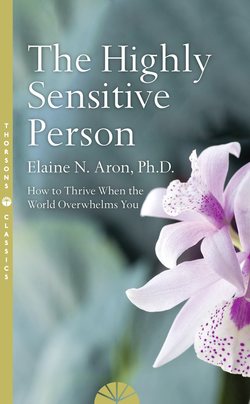Читать книгу The Highly Sensitive Person - Elaine N. Aron - Страница 40
You Are More Than Genes and Systems
ОглавлениеLet’s not forget that you are a complicated being. Certain investigators, such as Mary Rothbart of the University of Oregon, are adamant that temperament is quite a different matter when you study adult humans, who can reason, make choices, and exert willpower to follow through on their choices. Rothbart believes that if psychologists study children and animals too much, they will overlook the role of human thinking and a lifetime’s experience.
Let’s go over your development, and Rob’s, as Rothbart sees it, and how being sensitive would differ at each stage.
At birth, an infant’s only reaction is negative—irritability, discomfort. Sensitive babies like you and Rob were mainly different in being more irritable and uncomfortable—what Kagan called “highly reactive.”
At about two months the behavioral-activation system becomes functional. Now you showed an interest in new things in case they might satisfy your needs. Along with that came a new feeling—anger and frustration when you did not get what you wanted. So positive emotions and anger were possible, and how much you felt them depended on the strength of your activation system. Rob, having both systems strong, became an easily angered baby. But sensitive babies with a low activation system would be placid and “good” at this age.
At six months your superior automatic pause-to-check system came on line. You could compare present experiences with those of the past, and if the present ones were upsetting, as those in the past, you would experience fear. But again, you saw more subtle differences in each experience. For you there was more that was unfamiliar and possibly frightening.
At this point, six months, every experience becomes very important for HSPs. One can see how a few bad experiences when approaching new things could turn the pause-to-check system into a pause-and-do-nothing system, a true inhibition system. The best way to avoid bad things would seem to be avoiding everything. And, of course, the more the world is avoided, the newer everything will seem. Imagine how frightening the world could have seemed to you.
Finally, around ten months, you began to develop the ability to shift your attention, to decide how to experience something, or to stop a behavior. Only at this point could you start to handle conflicts between the two systems. A conflict would be I want to try that, but it seems so strange. (At ten months we might not use those words, but that would be the idea.) But now you could make some choices about which emotion to obey. One could almost see Rob doing it: Okay, it’s unfamiliar, but I’ll go ahead, anyway.
You probably had favorite methods of overriding the pause-to-check system if it slowed you too long or often. One way might have been to imitate those with less of it. You just went ahead and got some good things, too, like them, in spite of your caution. Another might have been the recategorizing of the stimulation to make it familiar. The growling wolf in the movie “is just a big dog.” But most of your help probably came from others who wanted you to feel safe, not afraid.
Social help with fears involves yet another system that Rothbart believes is highly developed in adult humans. It also arrives at about ten months. With it, a child begins to connect with others, to enjoy them. If these social experiences are positive and supportive, another physiological system develops for which humans are biologically prepared. One could call this the loving system. It creates endorphins, the “good feeling” neuro-chemicals.
How much could you overcome your fears by trusting others to help? Who was around whom you could rely on? Did you act as if Mother is here so I’ll try? Did you learn to imitate her calming words and deeds, applying them to yourself? “Don’t be afraid, it’ll be okay.” I have seen Rob using all of these methods.
Now you might spend a moment thinking about yourself and your childhood, and we will do more of this in the next two chapters. I know you don’t really remember, but judging from what facts you have, what was that first year probably like? How does your thinking and self-control affect your sensitivity now? Are there times when you can control your arousal? Who taught you to do so? Who were your role models? Do you think you were taught to control your cautiousness too much so that you dare to do more than your body can handle? Or does it seem that your lesson was that the world is unsafe and over-arousal is uncontrollable?
